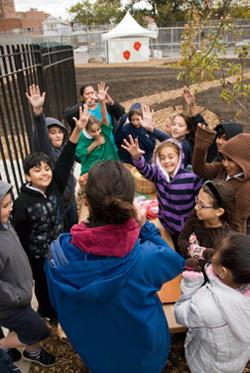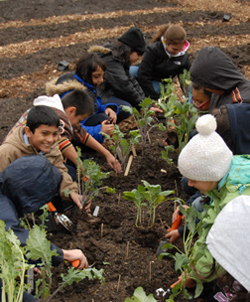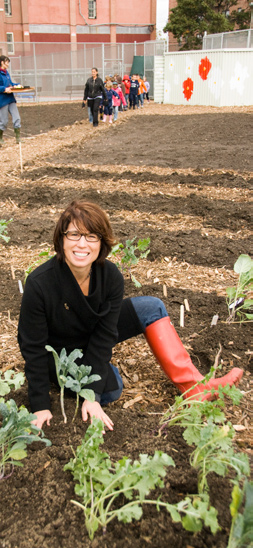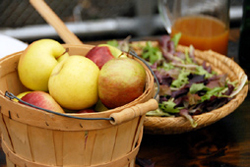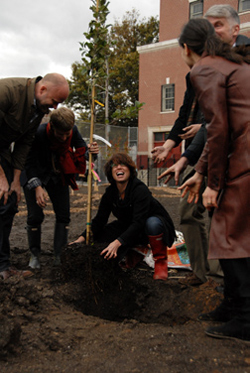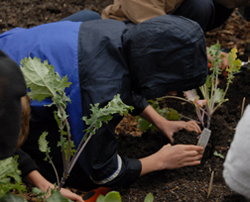Student Profile: Christiane Baker
Cultivating Awareness, Community and an 'Edible Education'
Cultivating Awareness, Community and an 'Edible Education'
On the eve of the launch event for Edible Schoolyard NYC, Christiane Baker, the organization’s director, was alone in the kitchen of P.S. 216 in Gravesend, Brooklyn, washing more than 1,000 organic apples.
It was par for the course for a woman—and an organization—whose mission is to teach that food isn’t just a commodity that appears on our plates, but instead comes from somewhere, goes somewhere and should be a labor of love in between.
Indeed, under Baker, a part-time student in TC’s Nutrition Education Master’s degree program, Edible Schoolyard NYC, a teaching garden located at the Arturo Toscanini Elementary School in the Gravesend section of Brooklyn, is partnering with the College on a garden-themed curricula that will enable children to enhance their learning in areas such as math, reading and art.
“Instead of the old slogan, ‘Reading, Writing and Arithmetic,’ we want to change it to, ‘Eating, Reading, Writing, Arithmetic,’” says Baker.
Edible Schoolyard was founded in Berkeley, California, by famed Chez Panisse chef and organic food activist Alice Waters. There are now affiliates in Los Angeles, New Orleans, and Greensboro, North Carolina, but New York City’s chapter—a half-acre of land that was transformed into crop-ready soil this past fall—is the organization’s first four-season garden.
At Arturo Toscanini, students will help grow more than 50 kinds of vegetables and a variety of grains. They already have planted Asian pear trees, three different types of apple trees, kale, collard greens, escarole, fennel and garlic. The students will also learn to prepare food they’ve grown in the school’s new kitchen classroom. During the week of Thanksgiving, the students harvested food from the garden, which then became part of their school lunch. Food scraps were composted in the garden.
“The kids get to witness the magic,” says Baker. “They participate in the whole cycle of food.”
Baker’s passion for food dates back to high school, when her mother declared she was finished cooking for the family. “I realized that if I wanted to eat—and eat well—I had to cook,” Baker recalls. She began scouring recipes in Gourmet magazine and experimenting with different dishes for her family dinner.
After Baker attended college at Barnard, where she majored in political science, she established a successful career in communications, becoming director of New York Governor Mario M. Cuomo’s News Unit. But her interest in food and health remained strong. She also served as a marketing and outreach consultant at the Harris Obesity Prevention Effort (HOPE) Center at New York University, where she learned about the behavioral aspects of obesity, as well as prevention strategies. Later, after founding her own media company, she developed a national television show for preschoolers on PBS, called Franny’s Kitchen, which was designed to teach children where food came from. The show’s messages were much like Edible Schoolyard’s, which was no surprise, considering that Waters served as a consultant.
But Baker’s real “lightbulb” moment as a food activist came 10 years ago, after she and her husband started Schneider Vineyards, on Long Island’s North Fork. Almost immediately, chemical salesmen began knocking on their door. Eager to avoid the pesticide route, Baker paid a visit to the Cornell Cooperative Extension, a local resource on all-things food- and agriculture-related, and asked if there wasn’t an alternative.
At the time, not many people in the Northeast were thinking along these lines: the answer was ‘no.’ So Baker got trained in the chemical application of pesticides and learned that people were advised to avoid sprayed areas for four days. She remembered from her time in Cuomo’s office that the high incidence of ground water pollution was a factor in soaring breast cancer rates. From then on, she vowed to eat organic—a value that became all the more important with the birth of her daughter, Chloe, in 2002.
“After my daughter was born, I learned first-hand how hard it is to feed a child well with our current food system and culture,” she says.
Baker started to think about how she might be able to make a difference in the areas of food policy, food systems and childhood obesity. She applied to the Master’s Program at TC to position herself for the next phase of her career. She says, “When I started the program, I thought, working for Edible Schoolyard would be my dream job—and then in April, it happened.”
If anything, the experience has exceeded her expectations. The community aspect of the garden has been incredibly positive, she says, bringing together students, teachers, parents and other people from the neighborhood, including a man who graduated from P.S. 216 in 1927. Families from Italy, the Ukraine and Yemen have offered both recipes and crop suggestions, based on their cultural heritage.
“Not only are families reconnecting over food, but parents are eager for cooking classes and nutritional advice,” says Baker.
Edible Schoolyard NYC is the first Edible Schoolyard with a greenhouse that will enable kids to grow food year round in NYC. Based on P.S. 216 parent community’s reactions, there is a real, well, hunger for this type of garden program.
Baker’s vision is to create a mobile kitchen, so that when the program expands next year, on a modified scale, to 25 area public schools in Brooklyn, those students can also have cooking classes. Ultimately, Baker hopes that every child in New York City can have access to an “Edible Education,” with an “Edible Academy,” like P.S. 216, in every borough. Baker and her colleagues at Teachers College are partnering to collect data on the effectiveness of the program.
“We’d love to measure whether or not this program had an impact on the servings of vegetables that children eat, as well as, ‘Did this help standardized test scores?’” says Pamela Koch, Executive Director of TC’s Center for Food & Environment, whose Linking Food and the Environment (LiFE) program is a basis for the new curriculum being developed by Edible Schoolyard New York and TC.
When she’s not at P.S. 216, Baker can be found cooking at home with Chloe in the kitchen they’ve dubbed the “C & C Cookshop.” Now eight, Chloe has developed two specialties: omelets and Caesar salads. Says Baker, “I really believe kids can do a lot in the kitchen if given the chance.”
Published Monday, Dec. 20, 2010
